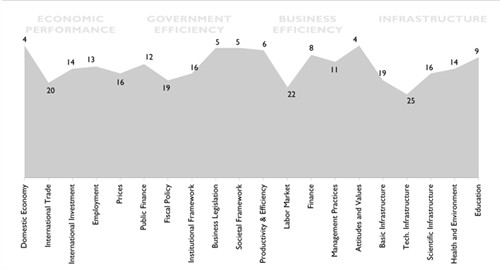Explore our Progress 2050 Goal Tracker
The rise points to the relative strength of the domestic economy and its resilience to economic cycles.
Strong Asian demand for commodities underpinned the rise. However, it underscores the critical need to maintain high levels of investment in the resources and infrastructure sectors.
2010 of scoreboard pdf (country rankings)
Figure 1. Australia's Competitiveness Landscape
Source: IMD World Competitiveness Yearbook 2010: Australia Country Profile, page 66
2010 rankings
For the first time in decades, Singapore (1) and Hong Kong (2) pushed the US to third place. However, the three countries are so close they should be called the leading "trio".
|
1. Singapore (3) 2. Hong Kong (2) 3. USA (1) 4. Switzerland (4) 5. Australia (7) 6. Sweden (6) 7. Canada (8) 8. Taiwan (23) 9. Norway (11) 10. Malaysia (18) 11. Luxembourg (12) 12. Netherlands (10) 13. Denmark (5) 14. Austria (16) 15. Qatar (14) 16. Germany (13) 17. Israel (24) 18. China Mainland (20) 19. Finland (9) 20. New Zealand (15) |
21. Ireland (19) 22. United Kingdom (21) 23. Korea (27) 24. France (28) 25. Belgium (22) 26. Thailand (26) 27. Japan (17) 28. Chile (25) 29. Czech Republic (29) 30. Iceland 31. India (30) 32. Poland (44) 33. Kazakhstan (36) 34. Estonia (35) 35. Indonesia (42) 36. Spain (39) 37. Portugal (34) 38. Brazil (40) 39. Philippines (43) 40. Italy (50) |
41. Peru (37) 42. Hungary (45) 43. Lithuania (31) 44. South Africa (48) 45. Colombia (51) 46. Greece (52) 47. Mexico (46) 48. Turkey (47) 49. Slovak Republic (33) 50. Jordan (41) 51. Russia (49) 52. Slovenia (32) 53. Bulgaria (38) 54. Romania (54) 55. Argentina (55) 56. Croatia (53) 57. Ukraine (56) 58. Venezuela (57) |

